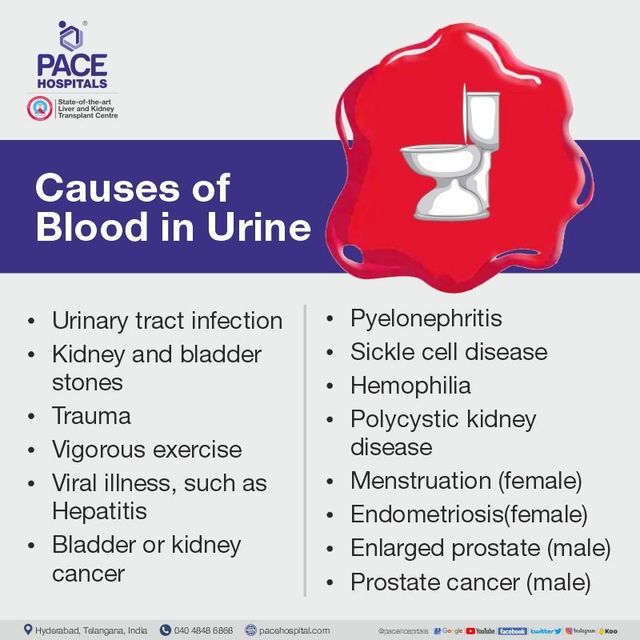Table of contents
Blood in urine is often caused by urinary tract infections, or UTIs. You may notice macroscopic blood in your urine which can be seen with naked eye, or microscopic which requires special equipment to observe it.
If you experience blood in your urine even once, contact a healthcare provider immediately to make an appointment and arrange an exam.
Causes of Blood Clots in Urine
Hematuria, or blood clots in urine, stem from diverse factors. Some possible triggers include:
- Urinary Tract Infections: Infections in the urinary tract, like kidney or bladder infections, induce blood presence and clot formation.
- Kidney or Bladder Stones: Stones in kidneys or bladder lead to irritation, harming the tract and causing blood and clots.
- Injury or Trauma: Urinary tract injury, e.g., kidney impact or recent procedure, causes blood appearance and clot creation.
- Medications: Specific drugs, e.g., anti-cancer cyclophosphamide or clot preventers, link to blood presence and clot generation.
- Inherited Illnesses: Genetic conditions like sickle cell anemia or Alport syndrome affect blood cells or kidney vessels, causing blood presence and clots.
- Age: Elderly men might have blood due to enlarged prostate, prompting clot creation. Age also heightens cancer risk leading to blood.
It’s vital to never dismiss blood clots in urine, as they might signal a severe underlying issue. When experiencing them, consult a doctor promptly for accurate diagnosis and treatment.

Possible Causes
When blood is detected in your urine (hematuria), the first thing to do is contact a healthcare provider.
Be sure to specify its color, as well as any blood clots seen either at the beginning, end or throughout your stream; different shapes of clots can indicate where bleeding may be coming from; for instance wormlike shapes might indicate bleeding from either urethra in women or prostate in men; sickle cell disease or Alport syndrome could be contributing factors as well.
Hematuria may appear either macroscopically, meaning you can see it with your own eyes, or microscopically when examined by a medical practitioner with a microscope.
Either way, hematuria should be taken seriously as it could indicate serious medical conditions needing immediate medical treatment – including kidney or bladder cancer which may prove deadly if left untreated immediately.
What Are the Symptoms of Blood Clots in Urine
Blood clots in urine manifest varied symptoms based on the underlying cause. Possible associated symptoms include:
- Visible Blood Clots: Clots, big or small, can be observed in the urine.
- Pain or Discomfort: Clots may induce urination pain or block urine flow, causing discomfort.
- Changes in Urine Color: Urine might turn pink, red, or brown due to clots.
- Lightheadedness: In severe cases, clots could signal a condition leading to lightheadedness.
- Inability to Urinate: Rarely, clots completely hinder urination.
Notably, some cases of blood clots in urine might lack symptoms, showing only microscopic hematuria, detectable solely via lab analysis. If these symptoms arise, consulting a doctor for proper diagnosis and treatment is advised.
How Are Blood Clots in Urine Diagnosed

Blood clots in urine are diagnosed using various methods. Healthcare providers assess medical history and symptoms to gather essential information.
Urine tests identify blood in the urine, determining its visibility (macroscopic) or invisibility (microscopic). These tests also detect infections and minerals linked to kidney stones.
Imaging tests such as CT scans, MRI scans, or ultrasound exams reveal the root cause of blood in the urine. They provide detailed images of the urinary tract, spotting abnormalities or potential causes of clots.
In some cases, cystoscopy involves inserting a thin camera tube into the urethra to inspect the bladder and urethra for irregularities or bleeding. This procedure can also treat certain urinary tract issues.
Experiencing blood clots in urine requires consulting a healthcare provider. They’ll select appropriate diagnostic tests based on your symptoms and history.
What Are the Treatment Options for Blood Clots in Urine
Treating blood clots in urine hinges on causes and severity. Options include:
- Conservative Care: For minor infections or trauma, fluid intake, pain relief aid healing.
- Medicines: Infections warrant antibiotics. Some cases use clot control or dissolution meds.
- Bladder Flush: Catheter flushes clots using syringe or saline solution.
- Cystoscopy: Tube-camera checks and treats bladder issues—clot removal, vessel cauterization, biopsies.
- Surgery: Severe cases (stones, tumors) might need surgery to tackle core problems.
Consult a healthcare provider to tailor treatment for your case.
How Long Do Blood Clots in Urine Last
Blood clots in urine are concerning and warrant attention. Duration depends on the cause:
- Urinary tract infection (UTI): Clots often resolve within days of antibiotic treatment.
- Kidney stones: Clots may persist for days or weeks until stones pass.
- Bladder cancer: Clots might appear and disappear over weeks or months.
- Prostate issues: Clots could last weeks or months due to prostate problems.
Consult a doctor if you have blood clots in urine, as they signal potential seriousness.

Preventing Blood Clots in Urine
Prevent blood clots in urine with these steps:
- Hydration: Drink water to fend off infections and kidney stones, common clot causes.
- Safe Sex: Practice safe sex to avert infections leading to bloody urine.
- Medication Caution: Some drugs up clot risk. Follow doctor’s guidance and monitor urine changes.
- Manage Conditions: Control underlying causes like enlarged prostate or genetic disorders.
- Swift Medical Help: Seek urgent care for diagnosis and treatment of clot episodes.
Note, not all cases are preventable due to external factors. Yet, maintaining urinary health and swift medical action can lower risk.














